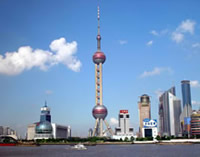|
|


ADVERTISEMENT
Buy Your own advertising
spaces!
.
Download Adobe Acrobat Reader to open [PDF] files.
Recent Visitors
Mind your language - Expo is just around the corner
2009. 1 June
by Yang Jian
(shanghaidaily.com) The Expo organizer has one slogan for Expo volunteers that reads "My Will, My Help, My Pleasure." Can you understand it?
Foreigners might be puzzled when they see this slogan on volunteers' uniforms, pointed out Lu Gusun,
"The phrase 'My Will' sounds like a last testament and foreigners will wonder what the volunteer is supposed to do." He said it would be better to change the word "will" into "determination."
Lu came up with a better expression after a quick thought - "Determined to help, delighted in helping."
Another Expo slogan says "Our City, Your Joy." Lu said it sounds like as though it is imposing the expression on foreign visitors. He suggested changing it to "Shanghai - made lovelier by us."
A common slogan in the city is "2010, we are together as one." Lu suggested something like: "In 2010, we are like minded."
A good slogan should be direct and comprehensible. It should let people get the idea as soon as they see the slogan, he said.
The main slogan for Expo volunteers is "At your service at Expo," which was written by Lu. "The slogan says 'I am ready to help' directly," he explained. Foreigners will understand that the person wearing the slogan is ready to offer help to them in a friendly manner.
The professor said he has received many other versions from the organizer as translations for slogans, but none of them sounded satisfactory. For example, one translation reads: "World is in front of you. We are by your side." This is like a "mentally challenging puzzle," Lu said.
The organizer likes to say they will "assure social safety" in the Expo site. It was hard to understand. A better expression would be to "maintain law and order."
Sometimes, it is better to retain the Chinese flavor when translating Chinese idioms and proverbs, because the Expo is to be held in China, Lu suggested. But he reiterated that it should be based on "acceptability," as a basic precondition.
When Lu translated the report into English for the Chinese government to bid for the 2010 event, he came up with a Chinese idiom which literally meant the sea is vast because it accepts all rivers. It could be translated simply into "all inclusive" or "receptive to all external influences," but the Chinese flavor would be lost.
Lu translated it into "Shanghai is like a sea into which all rivers and streams empty out."
Lu suggested Expo volunteers express themselves simply, directly, speak acceptable English and not ask irrelevant questions of foreign visitors. Visitors might be put off if a volunteer kept asking "where are you from" or "why are you coming here."
Another rule for volunteers is not to assume they know. For example, it would be better to ask foreigners "where do I put the stress" on a word than pronounce a foreigner's name wrongly.
There has been less Chinese Pidgin English in shops and streets across the city, but the language abilities of local people still need to be improved, the professor added.
The number of spelling or grammatical mistakes in public places across the city has scarcely decreased in recent years, according to a survey from the Woodpecker students' association of Shanghai International Studies University.
Students of the Woodpecker association visit local streets and business areas to search for poor English once a month. Although students insist that the managers correct the mistakes whenever they found mistakes, new mistakes appear from time to time, said Han Lingjie, a student who manages the association.
The "woodpeckers" found about 10 mistakes in the Nanjing Road Pedestrian Mall, the most popular downtown business center, in 2007, compared with eight during a recent survey in March, Han said.
The mistakes included spelling mistakes such as "PLOICE" on the gate of a police station and chinglish like "crab pink and small basket" (mini pork bun with crab roe) in the Yuyuan Garden, he said.
Shops, supermarkets and restaurants have the largest number of mistakes.


